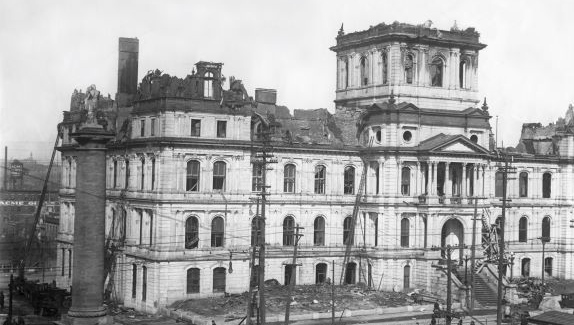The 1922 fire that burned down Montreal's City Hall, 100 years later
On March 3, 1922 — exactly 100 years ago Thursday — the night watchman at Montreal’s City Hall smelled smoke.
By the time firefighters arrived, flames were spreading through the building's walls. Within hours, City Hall was gutted, its roof and floors collapsed.
The first building in Canada constructed exclusively for use by a municipal government, the building had been a stronghold of Montreal’s Old Port since its construction in the 1870s.
Now, only its stone foundation remained.
"Part of the building was saved, the two sides were saved," explained Barry Adams, the former curator of the Montreal firefighters museum (MPM).
Despite the late hour, an estimated 2,000 onlookers had crowded the scene on Champ-de-Mars St. as the building was hosed down.
According to reports at the time, four alarms were sounded and 13 steam fire engines were deployed throughout the night while the fire raged on.
 Firefighters sprayed the flames with an estimated 50 powerful jets. (Barry Adams / Archives de Ville de Montreal)
Firefighters sprayed the flames with an estimated 50 powerful jets. (Barry Adams / Archives de Ville de Montreal)
Adams said the mayor himself, Médéric Martin, had rushed to the scene in the hopes of preserving important municipal documents.
"During the evening, around 2 o’clock in the morning, I think it was, he was called at home and he ran down to city hall to try and save some files," he said.
Some of city's archive was preserved, securely stored in fireproof safes — but "lots of historical files have been lost," said Adams.
 The floors of the building had collapsed through to the basement, its interior structures completely destroyed. (Barry Adams)
The floors of the building had collapsed through to the basement, its interior structures completely destroyed. (Barry Adams)
Although the exact cause of the incident is unclear, Adams said old buildings were far more susceptible to fires on account of their heating systems.
"Where today, it’s probably heated with natural gas or electricity, back then it would probably be coal stoves, furnaces," he said.
By 1926, City Hall had been rebuilt with the addition of a fifth storey, becoming the structure we know today.
Decades later, in 1984, the building would be declared a national historic site of Canada.
CTVNews.ca Top Stories

B.C. tenants evicted for landlord's use after refusing large rent increase to take over neighbouring suite
Ashley Dickey and her mother rented part of the same Coquitlam duplex in three different decades under three different landlords.
Mountain guide dies after falling into a crevasse in Banff National Park
A man who fell into a crevasse while leading a backcountry ski group deep in the Canadian Rockies has died.
Expert warns of food consumption habits amid rising prices
A new survey by Dalhousie University's Agri-Food Analytics Lab asked Canadians about their food consumption habits amid rising prices.
MPP Sarah Jama asked to leave Ontario legislature for wearing keffiyeh
MPP Sarah Jama was asked to leave the Legislative Assembly of Ontario by House Speaker Ted Arnott on Thursday for wearing a keffiyeh, a garment which has been banned at Queen’s Park.
Charlie Woods, son of Tiger, shoots 81 in U.S. Open qualifier
Charlie Woods failed to advance in a U.S. Open local qualifying event Thursday, shooting a 9-over 81 at Legacy Golf & Tennis Club.
Ex-tabloid publisher testifies he scooped up possibly damaging tales to shield his old friend Trump
As Donald Trump was running for president in 2016, his old friend at the National Enquirer was scooping up potentially damaging stories about the candidate and paying out tens of thousands of dollars to keep them from the public eye.
Here's why provinces aren't following Saskatchewan's lead on the carbon tax home heating fight
After Prime Minister Justin Trudeau said the federal government would still send Canada Carbon Rebate cheques to Saskatchewan residents, despite Saskatchewan Premier Scott Moe's decision to stop collecting the carbon tax on natural gas or home heating, questions were raised about whether other provinces would follow suit. CTV News reached out across the country and here's what we found out.
Montreal actress calls Weinstein ruling 'discouraging' but not surprising
A Montreal actress, who has previously detailed incidents she had with disgraced Hollywood producer Harvey Weinstein, says a New York Court of Appeals decision overturning his 2020 rape conviction is 'discouraging' but not surprising.
Caleb Williams, Jayden Daniels and Drake Maye make it four NFL drafts with quarterbacks going 1-3
Caleb Williams is heading to the Windy City, aiming to become the franchise quarterback Chicago has sought for decades.

































